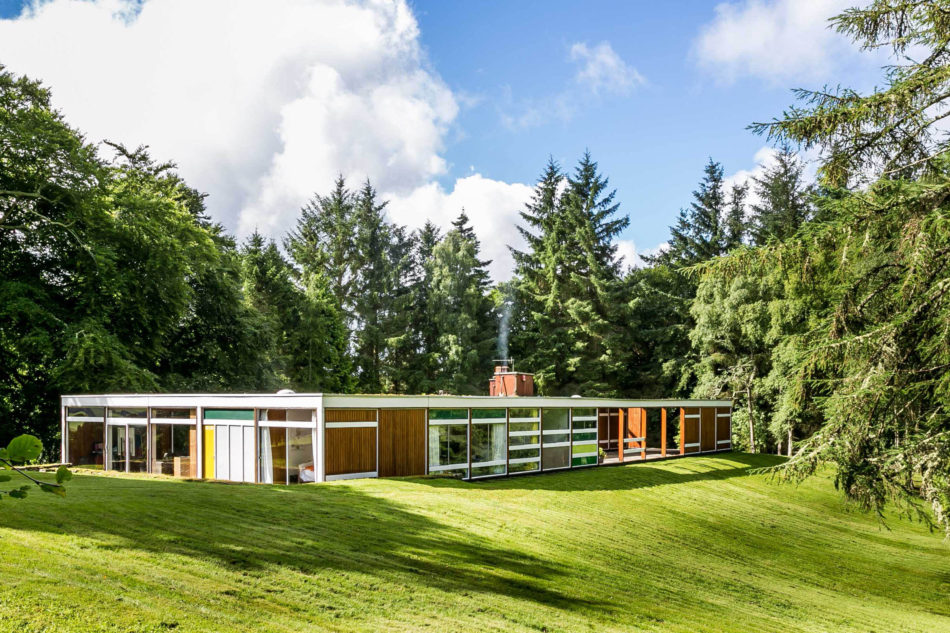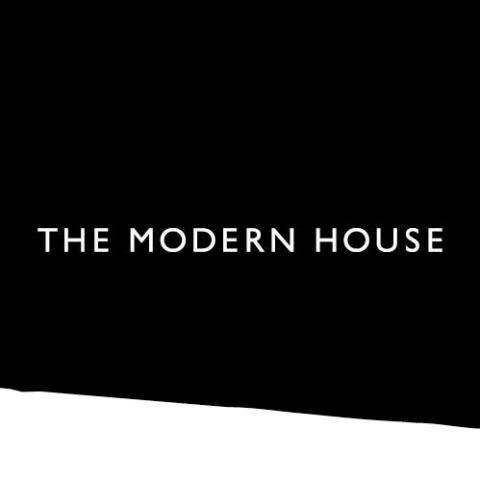
THE KLEIN HOUSE IS A SIGNIFICANT EXAMPLE OF THE EARLY WORK OF ACCLAIMED BRITISH ARCHITECT PETER WOMERSLEY THAT EMBODIES HIS SIGNATURE GEOMETRIC MODULAR DESIGN.
In 1957, the celebrated architect Peter Womersley designed one of the finest houses to have been built in Britain during the Mid Century period. It was commissioned by the renowned textile designer Bernat Klein and situated on a beautiful plot, approximately 3¼ acres acres and 35 miles south of Edinburgh, with far-reaching views of the Borders countryside.
Today, the four-bedroom house with a studio wing, which now has a rare Category A listing from the Historic Environment Scotland, is still in largely original condition and being put on the market by the Klein family for the first time.

building that sits successfully in its natural landscape due to its simple
flat-roofed design and the clever use of the open yet enclosed courtyard
spaces, which links the house to its environment."
The design of the single-storey house is essentially a rectangle subdivided into eight foot modules, with the form having been played with by Womersley to create courtyards and a carport seemingly within the structure of the building (it has been described by the architectural historian Alan Powers as “a clear rectangle outlined in white painted timber… sitting lightly on a sea of green grass”). The creativity of the design has been enhanced by the inventive use of a broad mixture of materials—including travertine floor tiles and exotic hardwoods such as idigbo and obeche—and also colourful internal and external tiling added by Klein.
The house is entered via the car port, with the front door opening onto an entrance hall that leads into the main living area. This is one of the most spectacular spaces seen in any residence of the period. Although not vast in size, it is exquisite in design, featuring travertine floor tiles, polished obeche wood ceiling, bespoke fitted furniture, and a sunken central seating area. Walls have been panelled with hardwoods including idigbo, rosewood, and walnut; and to one side, there is floor to ceiling glazing, which allows the light to flood in. Dividing the living area from the dining area is a "wall" of plants.

The living area incorporates a study area and library, which leads through to the master bedroom with a dressing area and en suite bathroom.

floor are paired with simple timber units.
The dining area leads through to the kitchen, which still features the original units. Opposite the kitchen is a shower room, utility room, and small bedroom. Beyond this is a larger family room (which was once divided into two bedrooms) and a further bedroom, which also benefits from an en suite bathroom.
The studio wing at the far end of the house was added in 1982, and although not designed by Womersley, it was added with his approval, not least because adaptability was part of the original design brief. This is a large, open room with floor-to-ceiling glazing on both sides and wonderful rural views, which could be used as a studio, as was originally intended, or further accommodation.

The house sits centrally on a beautiful rural plot of approximately 3¼ acres in size. It is a gently sloping clearing partly surrounded by woodland and bordering on open fields (from which it is separated by a dry stone wall) with far reaching views over the Ettrick Valley towards the triple peaks of the Eildon Hills. The site is largely lawn, with small areas of woodland.

Peter Womersely (1923 – 93) was a celebrated British architect who produced some of the very best buildings of the Mid Century period, notably a number of private houses including the wonderful Farnley Hey. Womersley was recently described by the prominent architecture critic Rowan Moore as “quite simply, one of the best British architects of the 20th century, and until recently one of the most overlooked”. He adds in an article published in The Observer that “his buildings are adventurous but poised; lucid, brave in conception and considered in their detail.”

dyed, and woven by Bernat Klein."
Bernat Klein (1922 – 2014) was an influential textile designer whose fabrics, used by the likes of Christian Dior, Balenciaga, and Yves Saint Laurent, did much to define high fashion in the 1960s.
This part of the Borders is renowned for its unspoilt beauty and salmon fishing in the River Tweed. Nearby towns include Selkirk, Galashiels, and the popular and pretty town of Melrose. Melrose has excellent schooling, dining, and shopping opportunities and a thriving cultural scene, including the annual Borders Book Festival. There is an excellent café, delicatessen, and bookshop, The Main Street Trading Company in nearby St. Boswells.
The recently opened Borders Railway, which runs from Galashiels, runs services to central Edinburgh in approximately 50 minutes. 
The property is currently for sale through The Modern House. View the sales listing here.

